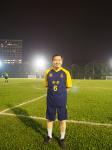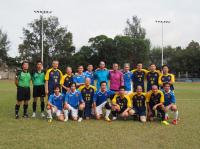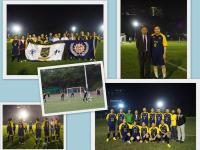1. How do you strike a balance between work and life on a hectic work schedule?
I have always believed in the motto: "Work hard, play hard." Work is important, but we need entertainment too, try not to bring your work home. The increasing popularity of electronic technology has pushed so many of my colleagues to work around the clock. Some colleagues were still sending e-mails to me in the small hours. Under such circumstances, there is no way we could strike a balance between work and life. I think my colleagues must try to develop a healthy interest in their spare time. Sports will be a good way to maintain both physical and mental health. I normally like hiking and playing football, and was even a former team member of the CU Staff Football Association!
2. In the face of pressure and difficulties at work, how do you keep up a positive and optimistic attitude?
When we encounter difficulties, we do not turn into a dead end by solely attending to our personal feelings and ignoring what's going on in other people's mind. More importantly, we ought to maintain a healthy state of mind. We shouldn't expect appreciation and deny criticism. On facing problems, we might as well talk to someone we trust and listen to the views of others. This may perhaps help us find solutions to a problem.
3. How would you improve confidence in your colleagues to help them rise to the challenge?
As a boss, I have a responsibility to make sure my colleagues feel supported, and that the whole team is marching towards the same goal. I will honestly reflect to the management difficult situations faced by my colleagues, such as when I found there was a shortage in front-line doctors in Hong Kong, I saw the need to reflect to my superiors that increasing the number of doctors would relieve pressure on my colleagues. I am aware of different strengths in people; some of my colleagues are good at teaching, others at research. Proper staff deployment will be a major asset for a person in charge.
So, I often encourage my colleagues to love their work, try what they can with their potential and strengths, and enjoy the satisfaction and fun that work brings. However, employees have to learn to say "no" when necessary, because if they don't handle the problem properly and only accept the situation reluctantly, misunderstanding may arise and may even lead to serious consequences.
4. If your colleagues suffer from emotional distress, how would you help them?
The Chinese University is an outstanding university, colleagues who work here have a sense of responsibility, and they have high ideals. But because of changes in the overall environment, such as in the past fifty years, CU has transformed from a local university into an international university. The previous focus on the teaching mode has transitted into a dual role in teaching and research. Such changes left some of my colleagues at a loss for how to adapt themselves to the situation. Workload increased, sometimes differences in values brought disagreement among colleagues and even disputes. Emotional problems easily appeared under the impact of various factors.
To help these colleagues, first and foremost I'll try to understand their situation, give them support and encouragement, and resolve the crux of the problem through communication. When necessary, I would advise them to seek professional help, such as medical staff at the University Health Service, counselors at the Employee Assistance Programme and colleagues from the Personnel Office, etc. In fact, the University has been committed to promoting the concept of positive communication to ensure the establishment of mutual trust and understanding among staff members. I hope our staff members are able to feel the University's sincerity ── through allocating various resources on their behalf so that they can continue in their contribution to the university and improve service quality.
5. Why did you engage in research on sleep medicine?
My choice of topic was largely due to a university teacher. I also wanted to know if reducing sleeping time could improve job efficiency. The answer is no. People do not understand the importance of a good sleep which gives the brain a chance to rest. Good sleep is the key to maintaining good health. Parents should make an effort in helping to form their children's good sleep habits which will lead to good physical and mental health, improve academic performance and behavior. Inadequate sleep will induce mild mood disorders in children and adolescents. What is more, sleep deprivation will affect the body's metabolism and endocrine, increase the risk of cardiovascular disease, obesity and diabetes.
6. You have been encouraging colleagues to participate in interest groups, are there any particular reasons for it?
As a university that places emphasis on the "human spirit", we should create a pleasant working environment, so that colleagues can become happy which will, in turn, enhance work efficiency. Precisely, interest groups (including active interest in training courses *) achieve the purpose of promoting all-round development and realizing people's potential, which will strengthen their capacity in facing adversity and pressure, and increase work satisfaction.
* Active interest, please refer to "Positive Workplace and Staff Development Electronic Newsletter" Issue 1.













